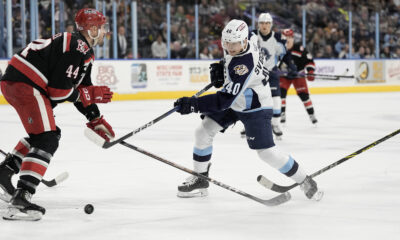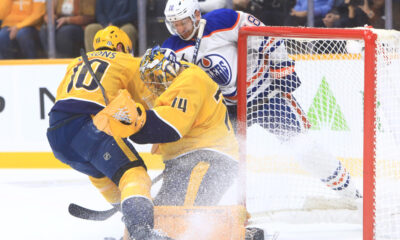When Peter Laviolette became the head coach of the Nashville Predators in 2014, he promised offense, offense and more offense.
Four years later, his team has become one of the offensive juggernauts of the NHL, matching elite forwards and defensemen with a system that emphasizes possession, shot attempts and lots of active pressure in the offensive zone.
 That system was on full display on Monday night as the Predators dismantled the Minnesota Wild 4-2. The Predators dominated most of the game with lots of pressure near the net, defensemen being active in the rush and forwards making plays in key situations. Most of Minnesota’s possession, conversely, came in the form of quick counterattacks and forechecking. As a result, the Wild only found one even-strength goal.
That system was on full display on Monday night as the Predators dismantled the Minnesota Wild 4-2. The Predators dominated most of the game with lots of pressure near the net, defensemen being active in the rush and forwards making plays in key situations. Most of Minnesota’s possession, conversely, came in the form of quick counterattacks and forechecking. As a result, the Wild only found one even-strength goal.
Quite simply, it was Laviolette hockey at its finest.
“Everyone has their own philosophy on systems,” defenseman Ryan Ellis said. “We have one view and other teams have another. It’s usually the team that executes whatever system they have in place that has success.”
What makes the win look even more impressive is the opponent they faced. While the Wild have stumbled out of the gate through the first five games, it’s still a 2018 playoff team featuring some top scoring talent, including the white-hot Jason Zucker.
All of that makes Nashville’s overwhelming shot attempt advantage through the first two periods that much more extraordinary.
“I think they have a very deep team over there and a lot of good players,” center Ryan Johansen said. “When our depth is showing in a game against a team like that, it’s a good sign when we’re in control of the game and shift after shift we’re outplaying them. I think that’s something that we should be happy with so far.”
As the game wound down in the third period after the Predators had taken a 3-2 lead thanks to a breakaway goal from Filip Forsberg, the Predators’ strategy shifted. The attacking, possession-based system transitioned into a lockdown defensive effort to preserve the victory. With the exception of a couple of fast-break opportunities that were stonewalled by Pekka Rinne, the bus was successfully parked and the Predators managed to come out with the win.
That type of 180-degree pivot in playing style displayed the adaptability of the team and the reliability of the blue liners and netminder.
“I thought we did what we needed to do during the course of the game,” Laviolette said. “When it came down to the last 12 minutes or so, it wasn’t about scoring a goal anymore. It wasn’t about possession, shots. It was about making sure that we’re defending. We had a couple of holes in there, and when we did, Peks made big saves.”
“But, they’ve got a lot of firepower that’s coming at us, especially with their top two lines and their back end that jumps in all the time with pucks from the point. We just need to make sure we’re doing the right thing defensively, and I thought our guys did that for the most part just trying to limit those. There were one or two chances that we’d like to have back, but for the most part I thought we did a pretty good job from the last 12 minutes down.”
Between the defensive effort in the end and the offensive support in the beginning, it was a particularly good night to be a Predators defenseman. Mattias Ekholm got in on the scoring fun with a second-period goal to put the Predators up 2-1. All night, the defensemen were venturing towards the goal line and pressing high to generate offense.
 While the defense was a key part of why the Predators’ systems succeeded, it was a full-team effort that the team would like to take on the road this weekend.
While the defense was a key part of why the Predators’ systems succeeded, it was a full-team effort that the team would like to take on the road this weekend.
“It starts with our forwards forechecking, getting the puck out to us and then us moving our feet,” Ellis said. “It’s a five-man attack and it’s good to see.”
The Predators trek to the Great White North this weekend for back-to-back matchups with the Calgary Flames and Edmonton Oilers.
























